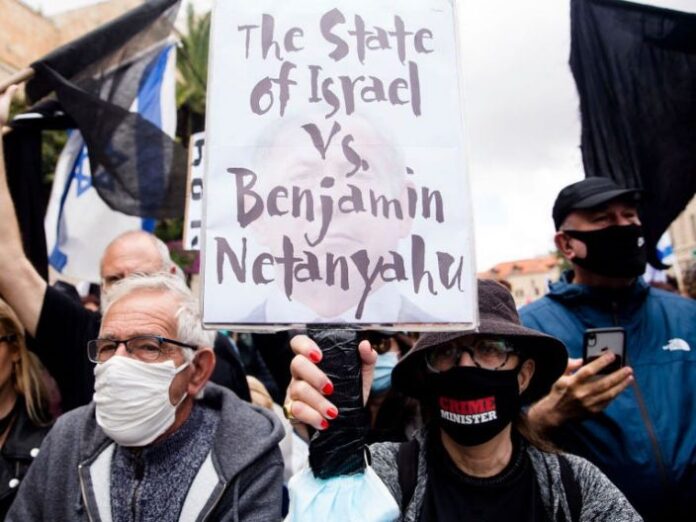Anger at Israeli government mounts after military admits to mistakenly killing hostages

Mounting anger at the Israeli government spilled onto the streets of Tel Aviv Saturday after it emerged that the country’s military had mistakenly killed three hostages in Gaza who “had a stick with a white cloth on it.”
In a plaza in downtown Tel Aviv known as “Hostage Square,” Raz Ben Ami, who was released from captivity late last month, told a crowd of hundreds that she had “warned” the Israeli government that military operations in Gaza were putting hostages at risk and had “unfortunately” been proven right.
Emotions were raw a day after news broke that Yotam Haim, Samer Talalka and Alon Shamriz had been killed by soldiers from their own side.
Ben Ami, whose husband, Ohad Ben Ami, remains in captivity, told the crowd that Prime Minister Benjamin Netanyahu’s war Cabinet should present a proposal to free the dozens of people still held by Hamas.
Holding an hourglass, Ruby Chen, whose 19-year-old son Itay Chen is still being held hostage, said the government “needs to be active” in getting a new deal. He added that it was evident the current strategy wasn’t working very well.
‘He also dies’
The protest, which followed another demonstration on Friday night, erupted after an official from the Israel Defense Forces revealed Saturday that the hostages “had a stick with a white cloth on it” before they were killed.
The hostages were believed to have either “been abandoned or escaped” Hamas’ captivity, the official said, adding that a soldier felt threatened and opened fire.
“Two are killed immediately, one is injured and runs back into the building,” the official said. He added that a “cry for help” had been heard in Hebrew, but after the battalion commander issued a cease-fire order there was “another burst of fire,” and “he also dies.”
READ ALSO: Buhari, a man of “undiluted integrity,” Tinubu eulogises predecessor at 81
A preliminary investigation has been launched “at the highest level,” the official said, adding that the conduct went “against our rules of engagement.”
His comments came less than 24 hours after Netanyahu offered his condolences to the families of the dead in a post on the social media platform X.
“The entire state of Israel will mourn this evening,” he said Friday. “This is a combat zone where there have been many incidents in recent days. Immediate lessons from the event are now being passed on to all the fighting forces in the field.”
Around 1,200 people were killed in Hamas’ deadly attack on Oct. 7, and Israeli military officials say 116 soldiers have been killed during the country’s ground invasion in Gaza. The Israeli prime minister’s office estimated that around 115 of the roughly 240 people taken hostage by Hamas remain alive in the enclave after more than 100 were freed during a pause in fighting at the end of November.
Inside Gaza, more than 18,700 people have been killed, while around 90% of the population has been displaced, with many living in spiraling humanitarian conditions, according to estimates from the United Nations.
At Saturday’s demonstration, Lee Siegel, 71, whose brother remains held captive by Hamas, said he wanted the Israeli government to assure him and others that securing a deal to free hostages is a top priority.
But, he said: “I think that if the hostages are indeed the priority then the government has disappointed in a big way.”
Keith Siegel, 64, and his wife, Aviva Siegel, 62, were kidnapped from their home on the kibbutz Kfar Aza on Oct. 7. Aviva Siegel was released several weeks ago, but Keith Siegel, who is an American-Israeli dual national, remains in Hamas’ captivity.
Lee Siegel said he believes hostages, including his brother, will only be released “when there is not violence.”
“I firmly believe Israel needs to come to a government decision that we are back to negotiating and that this is what we’re going to do until we get the hostages returned,” he said.
But, he said he wasn’t convinced that message would be received by Israel’s leadership, saying Netanyahu appeared more focused on his “political survival.”
‘Every incentive to keep the war going’
U.S. and Israeli officials have told NBC News they fear that some of Netanyahu’s positions on the war are rooted in a bid to prolong his political survival.
And with a growing sense he will not be able to maintain power once the fighting ends, they said he has a strong motive to prolong Israel’s offensive in the enclave.
“He has every incentive to keep the war going, to ensure his political survival,” one U.S. lawmaker, who asked not to be named, said Friday.
Yohanan Plesner, president of the Israel Democracy Institute, also said Netanyahu is likely to have serious concerns about the “day after” the war.
“There, it seems that Netanyahu is not only worried about how to stabilize the security situation the day after, but also how such decisions might affect his political career and how to reinvent his political posturing” in “the way he manages those discussions,” he said.
Polls in recent weeks have also suggested Netanyahu could face a reckoning once the war does come to an end, with the Israeli leader’s approval ratings plummeting in recent weeks, while polling also suggests Israelis will demand those at the top take responsibility for this crisis.
In a survey conducted by the Israel Democracy Institute in late November, 72% of the 600 Jewish Israelis and 151 Arab Israelis polled said they believe there will be a wave of mass civil protests demanding those “responsible for the failures of October 7 are held to account.”
At least 73% of Jewish Israelis held that belief, along with 64% of the smaller pool of Arab Israelis surveyed.
While Israel’s military and security leaders have taken a share of the blame for the failures that allowed Hamas to launch its attack, Netanyahu has so far avoided publicly claiming any responsibility.
As calls grow for a cease-fire, Plesner said Netanyahu faces the difficulty of negotiating a deal that would see hostages freed without Hamas having to “pay a very dear price.”
And once the war is over, Plesner said, Netanyahu will face the fresh challenge of convincing Israelis “you still need me, regardless of what you think about my responsibility for Oct. 7.”
- NBCNews.com













